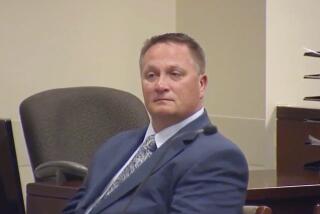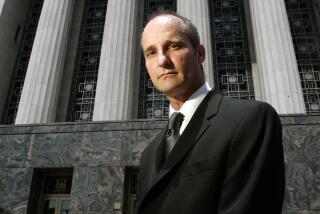Judges consider Jared Lee Loughner’s medication
- Share via
Prison doctors are violating the rights of Tucson shooting suspect Jared Lee Loughner by forcibly medicating him with drugs more powerful than needed to control his outbursts, defense lawyers told a federal appeals court Tuesday.
The three-judge panel weighing Loughner’s plea for an end to the involuntary medication with anti-psychotic drugs appeared sensitive to the defendant’s legal arguments that, as he hasn’t been tried on the 49 felony counts against him, he should retain the right to decide what drugs go into his body.
At a hearing that could determine whether Loughner is ever rendered competent to stand trial in the Jan. 8 attack that killed six and injured 13, including Rep. Gabrielle Giffords (D-Ariz.), the judges peppered the government’s lawyer with questions, suggesting they look askance at the prison’s practice of forcing psychotropic drugs on Loughner when mild sedatives would suffice.
At issue is whether Bureau of Prison policies for dealing with dangerous inmates apply to pretrial detainees, like Loughner, who was sent to a hospital in Springfield, Mo., on a federal judge’s order to try to restore his mental competency so he can stand trial.
Prison medical officials have rejected the defense’s calls for using tranquilizers or physical restraints, arguing that they need to treat Loughner’s underlying mental illness to prevent him from being a danger to himself or others.
Loughner was diagnosed with schizophrenia during an initial confinement at the Missouri hospital and deemed incompetent to stand trial in May by U.S. District Judge Larry A. Burns.
Assistant U.S. Atty. Christina M. Cabanillas told the panel that Supreme Court case law obliged them to defer to the prison administration’s judgment on what medication was necessary and appropriate to “mitigate his dangerousness.” Loughner has reportedly thrown the chair in his cell against the wall, spat at one of his attorneys and shouted expletives and unintelligible rants.
In legal papers filed with the court, Loughner’s attorneys argued that his behavior didn’t justify treatment with powerful anti-psychotic drugs, and that the medications could have long-term negative health effects and damage his ability to assist in his own defense if he is eventually put on trial.
In court, defense attorney Reuben Camper Cahn urged the judges to require prison officials to get federal court approval for their involuntary treatment plans.
One of the panelists, Judge J. Clifford Wallace, observed that Loughner might have a “liberty interest” in not being rendered competent to face charges that could lead to a death penalty.
Another U.S. 9th Circuit Court of Appeals panel last month issued a temporary injunction against forcing the drugs on Loughner, but prison doctors resumed them on July 18, citing emergency circumstances.
Tuesday’s panel, on which Wallace was joined by Judges Marsha S. Berzon and Jay S. Bybee, isn’t expected to rule for several weeks.
More to Read
Sign up for Essential California
The most important California stories and recommendations in your inbox every morning.
You may occasionally receive promotional content from the Los Angeles Times.











